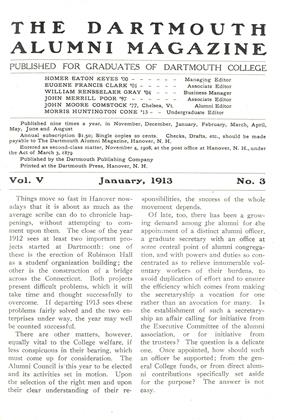that it is about as much as the average scribe can do' to chronicle happenings, without attempting to comment upon them. The close of the year 1912 sees at least two important projects started at Dartmouth: one of these is the erection of Robinson Hall as a student organization building; the other is the construction of a bridge across the Connecticut. Both projects present difficult problems, which it will take time- and thought successfully to overcome. If departing 1913 sees these problems fairly solved and the two enterprises under way, the year may well be counted successful.
There are other matters, however, equally vital to the College welfare, if less, conspicuous in their bearing, which must come up for consideration. The Alumni Council is this year to be elected and its activities set in motion. Upon the selection of the right men and upon their clear understanding of their responsibilities, the success of the whole movement depends.
Of late, too, there has been a growing demand among the alumni for the appointment of a distinct alumni officer, a graduate secretary with an office at some central point of alumni congregation. and with powers and duties so concentrated as to relieve innumerable voluntary workers of their burdens, to avoid duplication of effort and to ensure the efficiency which comes from making the secretaryship a vocation for one rather than an avocation for many. Is the establishment of such a secretaryship an affair calling for initiative from the Executive Committee of the alumni association, or for initiative from the trustees? The question is a delicate one. Once appointed, how should such an officer be supported; from the general College funds, or from direct alumni contributions specifically set aside for the purpose? The answer is not easy.
As a general proposition, however, THE MAGAZINE is inclined to believe that the mere fact of graduation from a college gives no man an inherent right to share in its management or in the control of its policy. Membership in the alumni association of Dartmouth might very properly be dependent upon a small tax assessed at the time of taking the vote for alumni trustee. The money thus raised could be applied directly toward the; support of an alumni officer. In so far, however, as this officer acted directly at the behest of the trustees and subject to their control, as would, of necessity often be the case, his expenses should be met from the College funds. Consideration of the whole project is scheduled for the annual meeting of secretaries, to be held in Hanover during the coming spring. THE MAGAZINE makes present suggestions for the sake of stimulating a little preliminary thought on the subject.
The annual report of the Tucker fund recently issued shows no very marked gain in the amount contributed or in the number of contributors. This is a fund, which should have.enthusiastic support from every alumnus of the College. That it has failed to win such support lies apparently in a lack of full understanding of its purposes. THE MAGAZINE hopes very soon to report action by the Tucker fund committee which will put the whole matter in a new light, and set up a target so clearly visible that alumni can not help throwing their dollars at it.
All this constitutes a fair bulk of College material which the alumnus may pack away in his mind for New Year's rumination. Yet the various considerations here advanced bear but slightly upon faculty or curriculum; they have to do primarily with efficient organization. Evidently the modern college is a great deal more than a group of sages droning wisdom to a listening circle of the elect. We may, perhaps, bemoan the fact, but we must face it none the less.
Mr. Tuck's gift of the Pope portrait of Webster is a characteristically graceful act. Dartmouth is always in his mind, and he makes us aware of the fact now in one way, now in another, but always with unerring timeliness, and with a sure instinct for the fitting and appropriate. His perception of the quality of the portrait in question bespeaks his just connoisseurship; his presentation of it to the College bespeaks his generosity. The resolutions which the students sent to Mr. Tuck when this latest gift had been announced may well be adopted as the sentiment of Dartmouth men in general:
"To Edward Tuck, of the Class of 1862, fellow Dartmouth man, generous benefactor of his Alma Mater, we the students, in mass meeting assembled, extend hearty greetings and sincere appreciation. The noble portrait of Webster which he has given to the College will serve as a worthy adornment of her halls: to the ever-increasing roster of her sons it will provide fitting reminder of the mighty men of old in whose, character and achievement were formed the sturdy traditions of Dartmouth.
"But we welcome this gift not alone for its artistic value, and its rich heritage of association; To us it is another evidence of that constant thoughtfulness for the College which has won for Mr. Tuck the loyal admiration of us all"
 View Full Issue
View Full Issue
More From This Issue
-
 Article
ArticleHANOYER AS A FIELD FOR OUTDOOR LIFE
January 1913 By James Walter Goldthwait -
 Class Notes
Class NotesLOCAL ASSOCIATIONS
January 1913 -
 Article
ArticleTHE FACULTY AND THE LEARNED SOCIETIES
January 1913 -
 Class Notes
Class NotesCLASS OF 1873
January 1913 By S. Winchester Adriance -
 Article
ArticleBOOK REVIEW
January 1913 -
 Class Notes
Class NotesCLASS OF 1901
January 1913 By Walter S. Young








